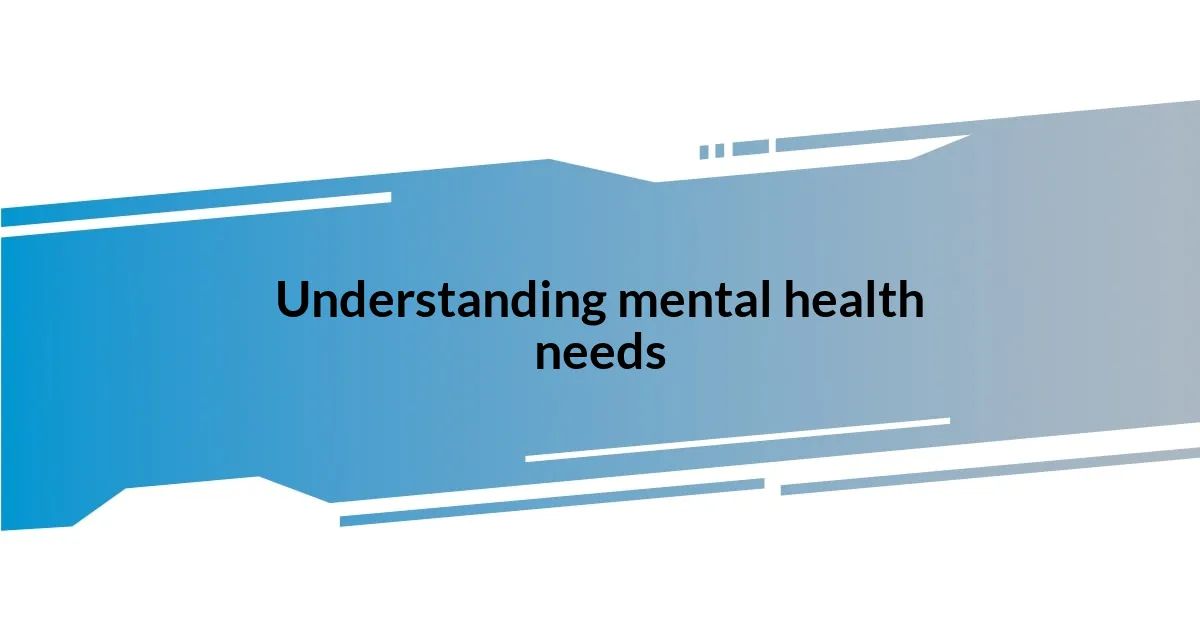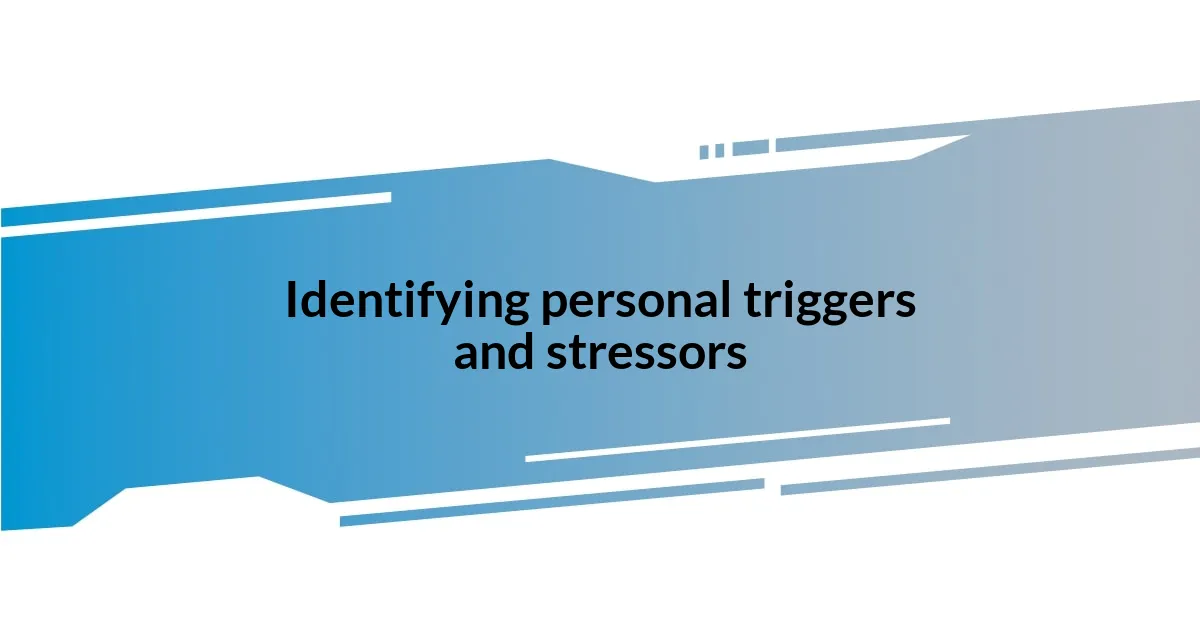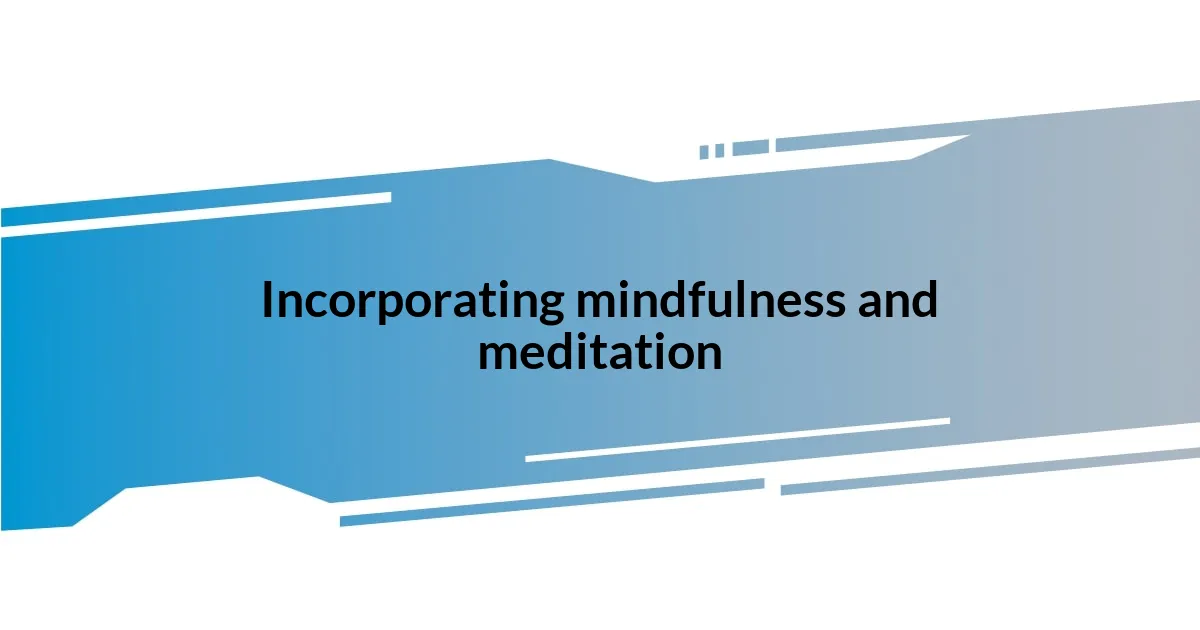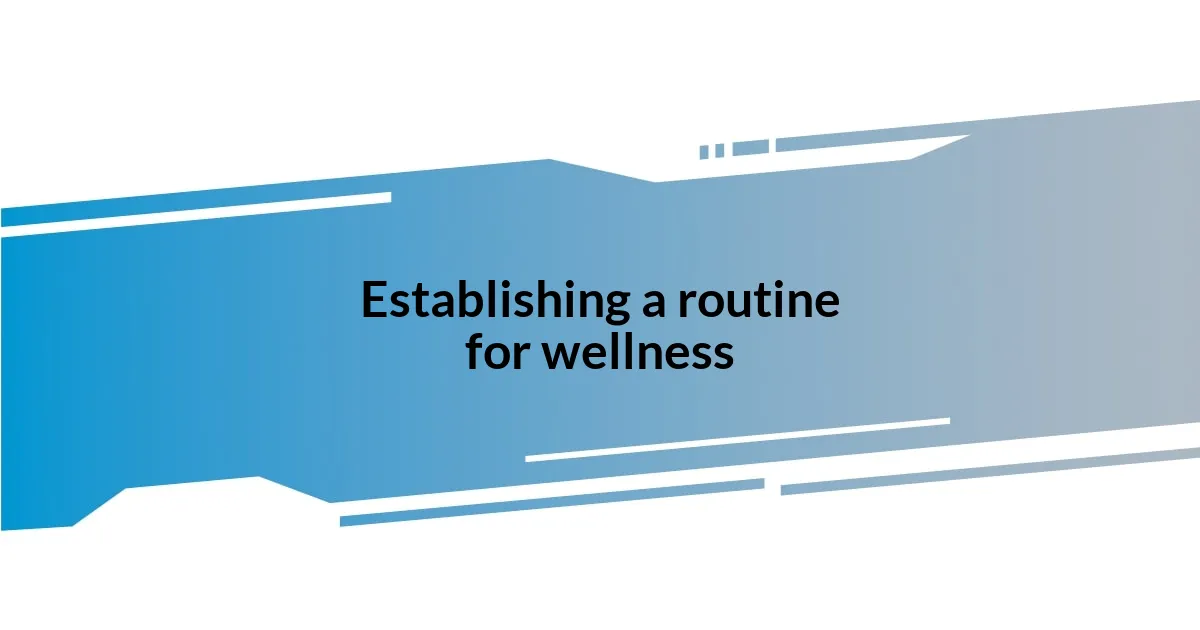Key takeaways:
- Understanding personal mental health needs involves self-reflection and experimentation, such as journaling to uncover one’s feelings.
- Identifying triggers and stressors is crucial for effective mental health management; tracking moods can help recognize patterns and adjust routines accordingly.
- Building a supportive social network enhances mental health; quality relationships provide resilience and a sense of belonging.
- Seeking professional help, such as therapy, can empower individuals to change unhelpful thought patterns and improve mental well-being.

Understanding mental health needs
Understanding mental health needs is a deeply personal journey for everyone. I remember when I first realized that my need for support wasn’t just a fleeting thought but a vital aspect of my overall well-being. Have you ever paused to consider how your day-to-day feelings reflect your mental health needs?
Every experience we go through shapes what we require to maintain our emotional balance. For instance, after a particularly challenging week at work, I found myself craving not just relaxation but meaningful connection with friends. It made me question: what do I truly need to feel grounded?
Sometimes, understanding these needs involves some self-reflection and experimentation. I once tried journaling to unravel my feelings better, and it was like turning on a light in a dark room. Could writing be a tool for you? It’s a simple act, yet it opened up an entirely new aspect of mental wellness for me.

Identifying personal triggers and stressors
Identifying personal triggers and stressors is essential for managing mental health effectively. I realized that certain situations would leave me feeling drained and anxious, often without fully understanding why. For instance, attending crowded social events can trigger feelings of overwhelm for me. Recognizing this, I began to prioritize smaller gatherings, where I felt more at ease and in control. Have you noticed how specific environments affect your mood?
Over time, I developed a habit of tracking my mood alongside my daily activities. This practice illuminated patterns I hadn’t noticed before. For example, I found that lack of sleep was a recurring trigger for increased anxiety. Now, when I feel that familiar weight on my chest, I can trace it back to several sleepless nights and adjust my routine accordingly. Have you considered keeping a similar log to uncover your own stressors?
Once I learned to identify and differentiate my triggers from stressors, I felt empowered to make meaningful changes. It’s fascinating how a simple awareness of my triggers reshaped my approach to stress management. I still remember a time when the pressures of work felt insurmountable, but pinpointing the exact contributors—like tight deadlines and unplanned meetings—helped me negotiate better boundaries and foster a supportive environment. What have you discovered about your triggers that has changed your perspective or response to stressful situations?
| Triggers | Stressors |
|---|---|
| Specific to personal responses | External pressures or situations |
| Can lead to immediate emotional reactions | Can accumulate over time |
| Often arise unexpectedly | Can be anticipated or planned for |

Incorporating mindfulness and meditation
Incorporating mindfulness and meditation into my daily routine has been transformative for my mental health. Initially, I felt skeptical about sitting in silence, wondering how it could make any difference. However, after just a few sessions of guided meditation, I discovered a newfound clarity. It felt as if I was stripping away the noise of daily life and tuning into my inner voice. Have you ever noticed how difficult it is to silence your thoughts? The simple act of focusing on my breath has become a powerful anchor.
- Mindfulness Techniques: I often remind myself to pause and engage my senses—what do I see, hear, or feel in the moment?
- Short Meditation Sessions: I began with just five minutes a day, gradually increasing to ten, which felt manageable and less intimidating.
- Journaling After Meditation: After each session, I jot down any insights or lingering thoughts. It’s like capturing fleeting ideas before they drift away.
- Mindful Walking: On days when I find it hard to sit still, I take mindful walks, focusing on each step and the sensations in my body.
This progression in my practice illustrates how mindfulness isn’t just about quieting the mind; it’s about embracing the present moment. Once, during a particularly stressful week, I implemented a short mindfulness break during lunch. Stepping outside and taking deep, intentional breaths not only re-energized me but also shifted my perspective on the day ahead. Have you tried integrating small moments of mindfulness into your routine? It’s those small adjustments that can yield significant benefits over time.

Building a supportive social network
Building a supportive social network has been a game-changer for my mental health. I remember a time when I felt overwhelmed and isolated, convinced I had to tackle everything on my own. Reaching out to friends and family turned my world around. Just hearing a familiar voice or sharing a laugh made the weight I carried feel lighter. Have you ever found solace in talking to someone you trust? It’s remarkable how a simple conversation can shift your perspective.
In my experience, quality trumps quantity when it comes to relationships. I’ve made a conscious effort to surround myself with people who uplift and encourage me. I often think about a close friend who always knows the right thing to say after a long day. Having these kinds of connections not only fosters resilience but also creates a sense of belonging. I’ve learned that it’s vital to invest time in nurturing these relationships, whether through regular check-ins or spontaneous coffee dates. How do you maintain your connections with those who matter most?
Additionally, I’ve noticed that being open about my mental health struggles invites support from others. When I share my journey, it can inspire someone else to share theirs, fostering a deeper understanding. Recently, I spoke candidly with a colleague about my experiences with anxiety, and it turned out they were facing similar challenges. That conversation not only strengthened our bond but also reminded me that I’m not alone in this journey. Have you ever found that vulnerability opens up new avenues for connection? Building this supportive network has truly enriched my life and I can’t recommend it enough.

Seeking professional help and resources
Seeking professional help has been one of the most important steps I’ve taken for my mental health. The first time I walked into a therapist’s office, I felt a mix of anxiety and relief. It was as if I was finally admitting I needed help, and that willingness began my journey toward healing. Have you ever felt that surge of hope when you realize support is just a conversation away?
I’ve learned that resources like therapy can offer invaluable tools for navigating my feelings. My therapist introduced me to cognitive-behavioral therapy, a technique that focuses on changing unhelpful thought patterns. Initially, I was skeptical—could talking to someone really change deep-seated beliefs? But, as I practiced reframing my thoughts, I discovered a shift in perspective that I hadn’t thought possible. The realization that I could influence my mental landscape was empowering.
Seeking professional resources doesn’t have to be a daunting process. Online platforms have made it easier than ever to find help. I remember scrolling through a mental health app during a particularly tough period, feeling lost in a sea of options. I decided to give a digital therapist a chance, and the convenience really worked for me. Have you ever found that modern technology can bridge the gap when you need support most? That experience truly highlighted how resources can adapt to our changing needs, making it easier to prioritize our mental well-being.

Establishing a routine for wellness
Establishing a routine has become a cornerstone in my approach to mental wellness. I remember when I decided to wake up at the same time each day; it seemed so simple yet brought a surprising sense of predictability. Have you ever noticed how a structured start can set a positive tone for the day? My mornings now include a small ritual of making tea and journaling for a few moments. It sparks creativity and grounds me before the chaos of daily life begins.
In my experience, consistency in daily habits plays a powerful role in how I navigate stress. I carve out specific time blocks for exercise, meals, and relaxation, and even the smallest changes lead to noticeable shifts in my mood. For instance, dedicating just ten minutes to stretching has transformed my afternoons; that brief pause can be a reset button amidst the hustle. Have you tried integrating small breaks into your busy schedule? You might be surprised at how they can enhance your overall mental clarity and focus.
I’ve also found that establishing a routine helps me maintain my connection to the things I enjoy. Each week, I set aside time for activities like reading or crafting, which serve as much-needed outlets for my emotions. Recently, I picked up a sketchbook and lost myself in creative expression for hours. It reminded me that engaging with my passions is essential for my mental health. How do you prioritize joy in your life? Incorporating these rituals not only boosts my mood but also reinforces a sense of purpose and fulfillment that I find incredibly nourishing.